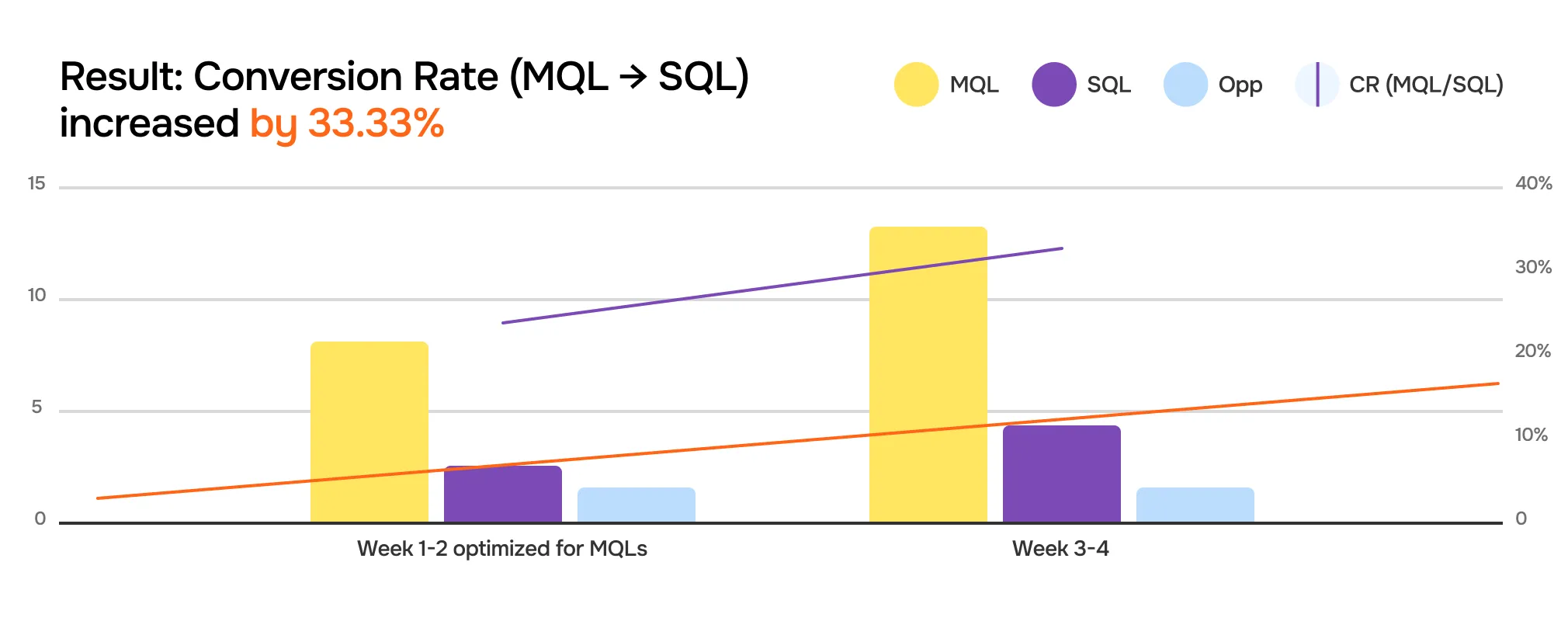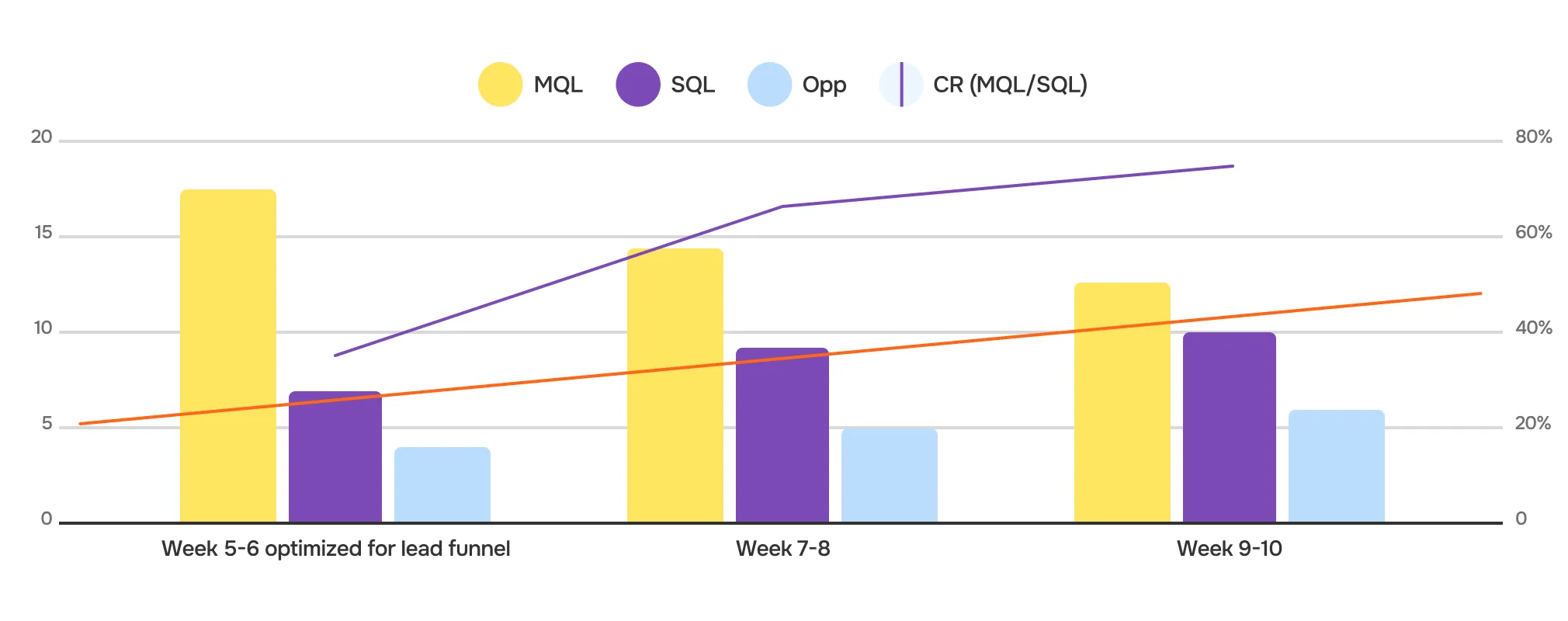
130% Pipeline Quality Boost for Cloudvisor With PMax

The Aimers team has fantastic project management skills. They always deliver on time and keep us in the loop about what's happening. The team is highly professional and knowledgeable. Their communication is well-structured, and they're proactive in reaching out with updates and ideas. One useful thing is that you have one person who's your point of contact, so the communication is smooth.
Cloudvisor is a global Advanced-tier AWS partner working exclusively with startups. Their offering — centered on the AWS Resell program — helps early-stage companies access cloud credits, optimize costs, and receive expert AWS support, all at no additional cost.
Despite a strong value proposition, Cloudvisor faced a challenge familiar to many growth-stage companies: a large share of their PPC leads were either irrelevant, unqualified, or simply too early in the funnel to convert.
increase in MQL → SQL conversion rate
growth in Opportunity volume
Challenge
Cloudvisor had previously experimented with Performance Max — Google’s AI-driven campaign format — but saw disappointing results. Leads generated were often spammy or low-intent, with little downstream value for sales.
This wasn’t a technical issue. It was a strategic one.
PMax relies heavily on machine learning to optimize across all Google surfaces. But without clear guidance and reliable feedback signals, its algorithms default to optimizing for volume, not value.
Our goal was to turn this around — to make Performance Max not just a lead generator, but a qualified lead generator.
Solution
Step 1: Establishing the Right Foundation
Before adjusting the campaign itself, we needed to align the data infrastructure with :
- Mapped the full sales funnel, from initial form submission to MQL, SQL, Opportunity, and Closed-Won.
- Integrated key conversion events from HubSpot into Google Ads, ensuring the algorithm could optimize for signals beyond the surface level.
- Audited lead qualification logic and refined status definitions (e.g., Top-Tier SQL) to capture quality early.
This was critical. With Google continuing to invest in AI-driven systems like PMax, campaign success is increasingly dependent on the quality of the feedback loop. In short: you cannot scale what you cannot measure properly.
Step 2: Narrowing the Optimization Goal
At launch, the campaign was set to optimize for general lead submissions to allow the system to collect baseline data.
But within two weeks, we transitioned the optimization to target only Marketing Qualified Leads — leads that met basic business validation criteria and showed intent to engage.
This shift significantly improved lead relevance.
Result: Conversion Rate (MQL → SQL) increased by 33.33%.

Step 3: Moving Toward Full-Funnel Optimization
One month in, we extended optimization across the full customer journey — incorporating not just MQLs and SQLs, but also Opportunities (Lead → MQL → SQL → Opportunity)
This allowed us to prioritize leads that were not only qualified, but had a higher probability of becoming revenue-generating customers.
Results 4 weeks post-implementation:
- CR (MQL → SQL) increased by 130.3% in comparison to the week of implementation.
- Opportunity volume grew by 50%.

Step 4: Optimizing for Custom Signals (Top-Tier SQLs)
To further improve campaign accuracy without sacrificing algorithm training volume, we collaborated with Cloudvisor to implement custom conversion stages:
- Top-Tier SQLs: Leads that had passed internal qualification and were likely to progress through the sales funnel.
By assigning different values to these conversion types in Google Ads, we provided clearer signals on what success looks like — enabling the system to optimize not just for quantity, but business impact.
The result was a continued increase in SQL and Opportunity, outpacing the cost growth — a clear indicator of improved performance.

Key Takeaways
Performance Max Requires Strategic Input
While PMax offers powerful automation, it does not replace strategy. Without the right signals, it will default to optimizing for volume — which, in most B2B funnels, results in high CPLs and low close rates.
To use it effectively, advertisers must define quality benchmarks early, implement clean CRM tracking, and pass this data back consistently.
Sales Funnel Alignment Is Essential
None of this would have worked without a well-defined sales funnel implemented by Cloudvisor’s team. By structuring the campaign around real sales milestones — not superficial metrics — we ensured alignment between spend and high quality lead generation.
The Value of Collaboration
Cloudvisor’s team was proactive and transparent throughout the process, which made it possible to iterate quickly, validate changes, and make optimization decisions based on full-funnel visibility. This level of partnership was fundamental to success.
Results
This project highlights the importance of optimizing not just for leads, but for the right leads. In B2B campaigns — especially those leveraging automated platforms like Performance Max — strong results come from clean data, thoughtful funnel design, and an unwavering focus on quality over volume.
With the right inputs, even the most intimidating campaign types can become consistent drivers of meaningful growth.
Explore More Success Stories
Check out Our Additional Services
Paid Search
Our targeted campaigns on Google Ads and Microsoft Ads ensure that your brand stands out at the right moment.
Paid Social
We run powerful campaigns on Facebook, Instagram, LinkedIn, and X to build your brand’s presence.
Conversion Rate Optimization
We optimize your site to maximize conversions, ensuring every visitor has the best chance to become a paying customer.
Landing Page Design
Our landing pages are designed to convert traffic into leads with engaging content and clear calls to action.


